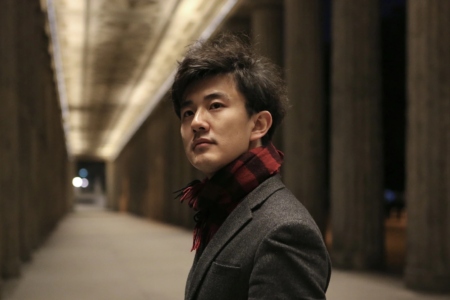What is a countertenor: Interview with Meili Li

We sat down with countertenor Meili Li, playing Licida in INO's production of L'Olimpiade to discuss what exactly is a countertenor and their significance in the Baroque period.
1. As a countertenor, could you explain to our audience what exactly a countertenor is and how it differs from other male voice types like tenor or bass or female alto?
A countertenor is a male voice type in classical music that uses mainly a falsetto or “head voice” to sing. Other male voice types use mostly their “chest voice” or, as we call it, “the modal voice.” The vocal range of a countertenor is like that of a female contralto or mezzo-soprano. In other words, a countertenor voice is typically higher than other male voices and has a very unique colour.
2. Can you tell us how you came to be a countertenor?
I am the first and probably the only Chinese countertenor to have an international career. I used to sing in a children's choir and, after my voice broke, I wanted to be able to keep my high notes. But I didn't even know what a countertenor was then, so I started singing with my falsetto. Because nobody really knew what a countertenor was back in China, I ended up coming across a teacher (who’d never taught countertenors before) and we just started doing some experiments. After four years of studying with him, I was then offered a master's degree at the Royal Academy of Music in London, and that's how I started my countertenor career.
I was amazed the first time I heard a proper countertenor voice. It was a recording by one of my idols, the German countertenor Andreas Scholl. It was a recording of Nisi Dominus by Vivaldi. I remember the first time listening to it at my dad's best friend's place and I just thought "I sing like that too”. I sang along, and that was a brilliant moment. I thought I was a freak for having this high voice, but others were singing like that too. So, at 18 I had already made up my mind, I wanted to be a countertenor in the future.
3. Vivaldi's L'Olimpiade was composed during the Baroque period. Could you shed some light on the historical use of countertenors during this time?
A lot of Baroque operas, like L'Olimpiade, are "opera seria", which means simply “serious opera” and at the time they were composed, many roles were sung by “castrati”. We now recognise as cruel the practice of castrating young men in order to prevent the vocal cords from developing thus preserving a high voice. But at that time, it was a vocal marvel, it was seen as a miracle, and there were a lot of virtuoso castrati singers who became superstars. Nowadays, the roles written for castrato signers are sung by countertenors or mezzo-sopranos.
4. Who was the role of Licida originally written for?
The role of Licida that was originally written for Angela Zanucchi, who was a contralto, female singer who sang mainly “trousers roles”, (a woman playing a man). Vivaldi wrote much of his work for female singers. I think it was because he had a lot of women in his choir and because castratos were seen as superstars at the time, they were very expensive to hire. So, he had to make do using mostly female singers, even for the male roles.

5. How do you think the timbre of a countertenor voices contributes to the overall atmosphere and emotion of the opera?
The countertenor voice, for me feels otherworldly because it's quite detached from reality as an everyday voice. You don't really hear people speaking in a countertenor register.
Even though the range of a countertenor voice is similar to some female voices, the timbre is completely different. The rich overtone gives it otherworldly colour.
For this show, we have a lot of female voices, and with the countertenor voice having its own unique style, so blending gender and voice with this musical tradition, it’s creates an interesting dynamic.
6. How do you interpret Licida's character in L'Olimpiade, can you tell us a little bit more about him? What aspects of his personality or story do you find most compelling?
Licida’s a very interesting character, he's also one of the most important in this opera. He is very much an entitled and privileged Prince, but has experienced a lot of problems and trauma growing up. He was abandoned by his father and then raised as the prince of a different country. I find it very interesting playing him because he is quite carefree in the first act, but has a clear goal that he hopes to achieve.
As we move on, Licida is faced with a lot of challenges and the reality of his situation begins to hit him and so he realises he didn’t necessarily make the best decisions for himself. I'm not going to spoil it, but during the course of the opera we see the growth of this young man and how his goal and past trauma affects him and the other characters. I also really love what Daisy (the director) is doing with the story.

7. Can you tell us about some of your musical highlights in this opera?
I'm very lucky to play Licida, who has some of the most beautiful music in the opera. For example, Mentre dormi, is a beautiful, slow movement, it’s been recorded by so many famous singers, and it's absolutely breathtaking.
Also his first aria called Quel destrier, we were joking in rehearsals that it’s almost like a Disney aria, there’s just so much joy and energy in it. Finally the third one, which is also quite famous Gemo in un punto e fremo which highlights the “terror” of what Licida is going through. It's quite a famous aria that really displays how Baroque music, depicts different moods and emotions.
8. In contemporary opera, how do you see the role of countertenors evolving compared to their historical roles?
That's an absolutely brilliant question. I believe that countertenors in contemporary opera are very different. When a countertenor was singing in a Baroque opera, everyone at that time knew it was a man singing and they were used to men with high voices. That wasn’t an uncommon practice and those audiences were used to it. High male voices were also associated with nobility and so leading roles were often written for castratos.
In contemporary opera, composers often use the countertenor voice to explore a character in terms of tempo and range. As mentioned earlier, the voice of a countertenor has a quality of “otherworldliness” - I've been playing a lot of these roles, and they are usually very funny or odd characters. A lot of these roles are based on antiquity and mythology. In my last contemporary opera at the Hamburg State Opera I played Adone in Sciarrino’s Venere e Adone, and I have also sung the role of Oberon in Britten’s A Midsummer Night’s Dream. There are so many weird and wonderful roles for countertenors in contemporary opera, and I love how they are used as a special and expressive musical tool. I look forward to seeing more countertenor voices being used in contemporary music.

9. What are you most looking forward to with this production?
I’m really looking forward to the tour. This is only my second time working in Ireland, so it will be interesting to travel throughout Ireland and perform in all of these different venues. Obviously, performing in the Royal Opera House, London and Fribourg, in Switzerland, I think it will be a really great experience.
I just love Baroque operas and I really enjoy performing them. Obviously, I enjoy singing; we are all opera singers, we love singing, but I also enjoy exploring these characters. There is a lot of “recit” (recitativo) so we’re not strictly timed with our delivery during moment of dialouge. This offers a lot of freedom in our delivery, allowing us to take a pause or change how quickly or slowly we’re singing. I’m finding it closer to a straight play so I’m really looking forward to being part of this production.

